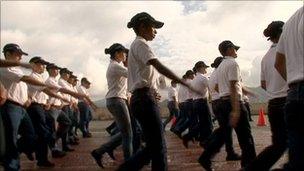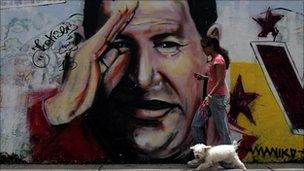Venezuela: A divided country?
- Published

New recruits for Venezuela's national police force are put through their paces
As Venezuela's new parliament meets for the first time, the BBC's James Robbins asks if the oil-rich country is now as polarised as its parliament, where the opposition has gained seats but only limited influence.
As I walk in, it sounds like a rowdy classroom almost anywhere in the world but, in fact, I am meeting young men and women in their late teens training as recruits for Venezuela's brand new national police force.
Among them is Luisiana Hermenio Gomez, who explains that she wants to change its poor reputation.
"The police in Venezuela have a very bad reputation," she explained, "both here and internationally.
"There was so much corruption. Many of the criminals in this country are policemen or former policemen. I have seen criminals stealing and then putting on police uniforms. These are bad things because the idea is to help the community, not to harm it. "
Outside, I watch as the recruits are put through their marching drills.
This programme has a huge significance for Venezuela. It is one response to deep ills running right through society - ills which are the product of decades of more or less bad government that have created huge tensions and divisions you can feel throughout the country.
<bold>Bitterly contested</bold>
There is no doubt that these young men and women represent what Venezuela hopes will be a better future in policing.
The government has conceded that one in five crimes are committed by the police themselves, so something radical had to be done - but how should Venezuela as a whole be transformed?

Mr Chavez has proved a polarising influence on the country
Every initiative - economic, social or political - is bitterly contested between, on one side, President Hugo Chavez and his government of Socialist Revolution and, on the other, a growing political opposition.
Some of them see even this new infant police force as sinister, creating an army of young Chavez loyalists to keep him in power for ever.
"What we are living in Venezuela is the classical military government," says Julio Borges, leader of opposition party First Justice, "plus left-wing radical ideology, plus control of the whole economy."
To gauge whether that criticism is really fair I meet a couple of ordinary Venezuelans, both working class.
Maria Eugenia sees herself as a winner under Mr Chavez.
Riding with her on the startling new cable car system in Caracas, built with some of the country's oil revenues to link shanty towns perched precariously on the capital's mountainsides to the riches and opportunities of the city centre, she is convinced that things have improved.
Doubtless it is a technological triumph - a series of interconnecting cable cars which bring some of the poorest much closer to the wealth of the capital - but I ask myself whether it is also an extravagant showcase for the Hugo Chavez Socialist Revolution.
It seems, in some ways, to conceal the fact that so little else has gone on in the country - so little of its oil wealth has been spent on similar infrastructure projects desperately needed to bridge the gap between the richest and the poorest in this society.
Yet that is a charge which could be levelled at many Venezuelan governments across several decades.
Wally Garcia sees himself as a loser under Mr Chavez.
As he showed me around the small flat he is buying, part of a vast private housing development outside Caracas which has now been nationalised, he expressed his sense that he is a double victim.
<bold>Polarised society</bold>
The process of nationalisation has led to delays and Wally also lost his job after his own employer was nationalised.
"What has died here is hope," he said.
"The hope of having a better quality of life. The government wants everybody to be equal but not equal and improving their lives, but equal in getting poorer."
This kind of hostility towards Mr Chavez is clearly spreading.
Venezuela's parliament is opening its new session and, after recent elections, there are now a record number of opposition deputies, holding about 40% of the seats.
But already Mr Chavez has moved to counter any risk that he could be forced to dilute any part of his radical agenda.
Last month, he announced special decree powers which limit parliament's ability to block his decisions. The move is highly significant, because, in 2012, he must face voters again in a bid to retain the presidency.
One of the final people I visited in Venezuela is one of his most ardent supporters - a former rebel fighter Lisandro Perez, nicknamed "Mao".
As we walk the shabby alleys of his neighbourhood, Mao tells me that Venezuela has always been polarised between capitalists and socialists.
"The fact now is that Chavez is the strongest man in this country. He leads the process and the only way to be defeated is that all the enemy forces conspire together for a coup, an election fraud, to create a situation of crisis. However, ordinary Venezuelans who live in this neighbourhood will defend the president."
I leave Mao, and Venezuela, increasingly convinced that the country is heading for greater, possibly dangerous, division.
- Published29 September 2010
- Published27 September 2010
- Published25 September 2010